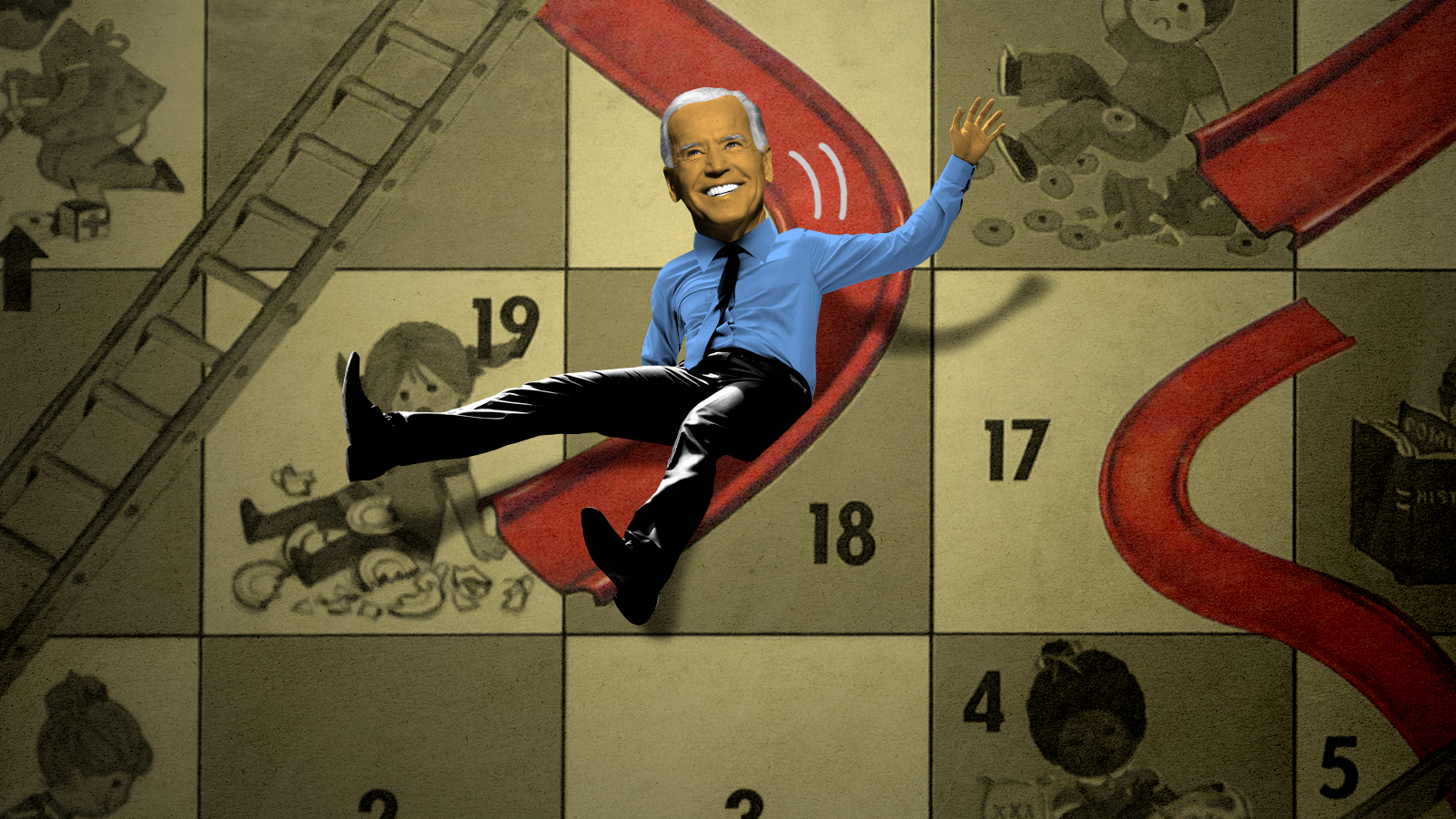Biden's bad polls are the new normal


A free daily email with the biggest news stories of the day – and the best features from TheWeek.com
You are now subscribed
Your newsletter sign-up was successful
Biden keeps getting bad news. According to yet another poll, his support has dropped well below 50 percent.
The decline seems to be driven by his leadership of the chaotic, bloody withdrawal of American personnel from Afghanistan. But the continuing pandemic and disappointing economic news, including a weak jobs report on Friday, probably won't help.
Democrats should definitely worry about the implications of Biden's slump for congressional elections in 2022 — and beyond. It's worth remembering, though, how consistent the pattern of declining approval and midterm losses has been among recent administrations.
The Week
Escape your echo chamber. Get the facts behind the news, plus analysis from multiple perspectives.

Sign up for The Week's Free Newsletters
From our morning news briefing to a weekly Good News Newsletter, get the best of The Week delivered directly to your inbox.
From our morning news briefing to a weekly Good News Newsletter, get the best of The Week delivered directly to your inbox.
By this stage in his presidency, Donald Trump's approval was under 40 percent, setting up big Democratic victories in 2018. By 2010, Barack Obama was polling in the low forties, setting up the biggest Republican gains in the House of Representatives since the 1930s. George W. Bush and his party initially escaped that fate, benefiting from a surge of support following 9/11. By the middle of his second term, though, he was polling well under 50 percent, leading to Democrats winning majorities in both houses of Congress for the first time since 1994 — when Republicans benefited from an early collapse in support for Bill Clinton.
It's not just Biden's approval trend that resembles previous presidents', moreover. No 21st century president has left office with a Gallup average over 50 percent.
These observations suggest Biden's woes are not solely attributable to the specific shortcomings of his leadership or policies, real as they are. In a highly polarized environment, it's extremely difficult for any president to sustain majority support. That's partly because recent presidents had little margin for error: Bill Clinton, George W. Bush, and Donald Trump all took office with pluralities or minorities of the popular vote. But even Obama, the only two-time popular vote winner since Reagan, struggled to translate big promises of hope and change into a successful agenda.
There's a precedent for the present situation in the 1970s, when a series of weak executives struggled to deal with challenging domestic and international circumstances. Looking farther back, we might find parallels in the period between 1876 and 1896, when just two presidential candidates won more than 50 percent of the popular vote. Either way, unpopular presidents have become the norm rather than the exception. We should adjust our expectations accordingly.
A free daily email with the biggest news stories of the day – and the best features from TheWeek.com
Samuel Goldman is a national correspondent at TheWeek.com. He is also an associate professor of political science at George Washington University, where he is executive director of the John L. Loeb, Jr. Institute for Religious Freedom and director of the Politics & Values Program. He received his Ph.D. from Harvard and was a postdoctoral fellow in Religion, Ethics, & Politics at Princeton University. His books include God's Country: Christian Zionism in America (University of Pennsylvania Press, 2018) and After Nationalism (University of Pennsylvania Press, 2021). In addition to academic research, Goldman's writing has appeared in The New York Times, The Wall Street Journal, and many other publications.
-
 The 8 best TV shows of the 1960s
The 8 best TV shows of the 1960sThe standout shows of this decade take viewers from outer space to the Wild West
-
 Microdramas are booming
Microdramas are boomingUnder the radar Scroll to watch a whole movie
-
 The Olympic timekeepers keeping the Games on track
The Olympic timekeepers keeping the Games on trackUnder the Radar Swiss watchmaking giant Omega has been at the finish line of every Olympic Games for nearly 100 years
-
 Big-time money squabbles: the conflict over California’s proposed billionaire tax
Big-time money squabbles: the conflict over California’s proposed billionaire taxTalking Points Californians worth more than $1.1 billion would pay a one-time 5% tax
-
 Did Alex Pretti’s killing open a GOP rift on guns?
Did Alex Pretti’s killing open a GOP rift on guns?Talking Points Second Amendment groups push back on the White House narrative
-
 Washington grapples with ICE’s growing footprint — and future
Washington grapples with ICE’s growing footprint — and futureTALKING POINTS The deadly provocations of federal officers in Minnesota have put ICE back in the national spotlight
-
 Trump’s Greenland ambitions push NATO to the edge
Trump’s Greenland ambitions push NATO to the edgeTalking Points The military alliance is facing its worst-ever crisis
-
 Why is Trump threatening defense firms?
Why is Trump threatening defense firms?Talking Points CEO pay and stock buybacks will be restricted
-
 The billionaires’ wealth tax: a catastrophe for California?
The billionaires’ wealth tax: a catastrophe for California?Talking Point Peter Thiel and Larry Page preparing to change state residency
-
 Trump considers giving Ukraine a security guarantee
Trump considers giving Ukraine a security guaranteeTalking Points Zelenskyy says it is a requirement for peace. Will Putin go along?
-
 Bari Weiss’ ‘60 Minutes’ scandal is about more than one report
Bari Weiss’ ‘60 Minutes’ scandal is about more than one reportIN THE SPOTLIGHT By blocking an approved segment on a controversial prison holding US deportees in El Salvador, the editor-in-chief of CBS News has become the main story
